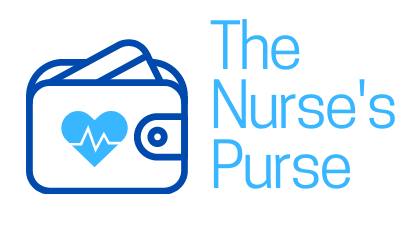Nursing is one of the most popular careers in the country, and being a nurse comes with its own unique financial considerations.
From budgeting to advancing your nursing career to purchasing insurance and investing in a retirement account, there are a few crucial parts of a strong financial game plan.
Use the personal finance guide for nurses below to set yourself up for financial success in your career and beyond.
Table of Contents
Budgeting
Establishing and sticking to a budget is one of the most significant moves you can make to transform your finances.
Whether you’ve been living paycheck to paycheck, you’re looking to improve spending habits, or you’re saving for something special, a budget can be the vehicle to reaching your goals.
To build and follow through on a budget, you should:
- Determine your income: Start by mapping out your monthly income. Fortunately, most nurses live on a dependable salary. But if extra shifts at the hospital or a health care side hustle make your income unpredictable, be sure your budget is balanced to consider both higher and lower earning months.
- Note your recurring expenses: Then, add up regular expenses like your rent or mortgage, car payments, and phone bill.
- Track your spending: See how much you spend on variable expenses like gas, groceries, eating out, and shopping.
- Know your goals: Tailor your spending to your budget’s goals, whether you’re saving for a major purchase or just trying to curb your spending. I
- Choose a budgeting strategy: Use the 50/30/20 rule or a zero-based budget to ensure your expenses don’t outweigh your income.
- Stay on track: Monitor your spending and put your money in designated envelopes for different spending categories if you need help sticking to your budgeting plan.
- Make adjustments: Tweak your budgets based on job changes, new savings goals, and added expenses, taking a look at your budget at least quarterly to see if it’s still a good fit.
Saving
Saving goes hand in hand with budgeting. If your car breaks down, a medical emergency occurs, or you lose your job, an emergency savings account can be a lifesaver.
Experts suggest building an emergency fund to cover at least 3-6 months of expenses.
Once you’ve built that safety net, you can also save towards specific goals, like a vacation, wedding, your child’s education, or a new car.
When it comes to your savings account, it’s important to keep your funds somewhere easily accessible. While you should consider other more lucrative investment accounts for your retirement savings, keep emergency funds and more targeted savings in a liquid account like a high-yield online savings account.
Earning
As you consider your nursing education and career, think of ways to increase your earning potential.
Here are a few ways to earn more as a nurse:
- Advanced degree: Consider going back to school to get your Bachelors, Masters, or Doctorate degree to unlock higher-paying nursing jobs.
- Certification: Some nursing certifications can help you earn more, like a Nurse Executive Certification or Nursing Informatics Certification. Several reputable organizations offer certifications for nurses.
- Leadership: If you’re a seasoned nurse and you’re skilled at decision-making, critical thinking, and interpersonal communication, consider applying for a leadership or management role.
- Networking: If you aren’t already, make an active effort to connect with other nurses. Take advantage of local opportunities, online communities, and associations to form relationships within your field.
- Side hustle: There are plenty of ways to earn extra as a nurse, like freelance writing for a healthcare blog, launching a home healthcare business, tutoring nursing students, or teaching CPR courses. The possibilities are endless!
Credit
Another key part of managing your finances is borrowing responsibly and maintaining a healthy credit score.
A good credit score can help you unlock competitive interest rates, increase your borrowing power, secure lower rates on homeowners and car insurance, and access rewards credit cards.
Use the tips below to improve your credit:
- Pay down debt: One of the best financial moves you can make is paying down your debt. Whether you use the snowball method and start with your smallest loan to gain momentum or begin with your highest interest loan, paying off debt can improve your credit and change your life.
- Consolidate loans: This may not be the wisest move if you took out federal student loans for nursing school, but you could save on interest by combining multiple private loans into a single one with new terms.
- Boost your score: There are several ways to improve your credit score, from making payments on time to keeping your credit utilization or the amount of available credit you use each month, to a minimum.
- Choose the right credit cards: If you don’t have much of a credit history or your score needs a lift, you could benefit from a secured credit card designed to help build credit. On the other hand, if your credit is thriving, you could be eligible for rewards credit cards that give you points or cash back when you make everyday purchases.
- Tap into nurse mortgage programs: One of the biggest loans you’ll likely take out is a mortgage. As a nurse, you have access to mortgage assistance programs for nurses, like Nurse Next Door and Homes for Heroes. These organizations can help with downpayments and cut down on lender and inspection fees.
Investing
Investing can help you create lasting wealth for your family. Regardless of your income, experience, or knowledge of investing, you can get started today.
Here are a few of the ways you can invest:
- Make the most of retirement accounts: You can make long-term gains by investing in a retirement account like a 401k or IRA. Take advantage of employer matches and make the maximum contribution you can each year.
- Choose the right investments: You have a wide range of investment options, from stocks and bonds to ETFs, mutual funds, and cryptocurrency. Do your homework, work with a financial advisor, or choose an investment app for beginners if you’re just getting started.
- Consider real estate investing: Whether you buy properties directly and rent them out to provide additional income or take a more hands-off approach and invest in a REIT (real estate investment trust), real estate investing can be very lucrative.
Tax
No one looks forward to paying income tax, but it’s a necessary part of life. How much you’re taxed depends on your income level.
If you’re an employee of a hospital, doctor’s office, or institution, you should get a Form W-2 and have taxes taken out of your paycheck.
If you’re a travel nurse, home health care nurse, or other contract worker, you’ll likely get a 1099-MISC tax form for freelancers and can deduct work-related expenses.
You may also be able to claim a credit for continuing education requirements or the cost of getting an advanced degree.
Insurance
While you hopefully won’t have to tap into your insurance policies often, they provide peace of mind and can be invaluable when the unexpected happens.
As a quick refresher, here are some of the most important types of insurance you’re likely to need:
- Health insurance
- Life insurance
- Car Insurance
- Homeowners/renters insurance
As a nurse, you also need to consider malpractice insurance or liability coverage.
Nurse malpractice insurance can help protect your assets and license and help with legal fees if a patient, their representative, or the state board of nursing seeks legal action against you.
Some employers offer a limited amount of malpractice insurance, which you can supplement with a personal policy from NSO or another insurer.
Tools and Resources
One of the biggest keys to success in your personal finances is using tools and resources.
Here are a few types of tools and resources available to you:
- Budgeting apps: Use an app like Mint to track your cash flow, manage subscriptions, create a budget, and more.
- Online calculators: There are online calculators for just about everything, from mortgages, to student loans, taxes, and life insurance planning.
- Online quotes: Compare quotes online before locking into a mortgage, loan, credit card, or insurance policy. There are plenty of reputable comparison platforms that offer quotes from multiple companies.
- Credit monitoring: Sign up for a free credit monitoring service like Credit Karma to get score updates, avoid fraud, get custom credit offers, and access educational resources.
- Money saving apps: Use a service like Trim to lower your bills and cancel unwanted subscriptions. They’ll negotiate lower bills for you with most service providers.
- Investment apps: Use investment apps to make investing easy. We recommend an app like Acorns for beginning investors.
- Tax apps: Filing Taxes is a chore. We recommend using a site like H&R Block to walk through the process. This is especially worth it if you’re filing taxes as an independent contractor.
- Personal finance blogs: Follow the advice on personal finance blogs like the Nurse’s Purse for practical advice on money management.
- Financial advisor: For specialized attention to your finances, consider working with a certified financial planner. They can advise you on your retirement planning, funding an education, insurance, and more.
FAQs
What is the 50/30/20 budget rule?
The 50/30/20 budget rule coined by Senator Elizabeth Warren says to allocate 50% of your income to your needs, 30% to your wants, and 20% to savings.
How do I structure my personal finances?
Here are a few pointers for structuring your personal finances:
- Track your spending and expenses
- Store bills, receipts, and financial records on an app or online services
- Automate payments
- Go paperless when you can
- Shred old non-essential documents
- Call 1-888-567-8688 to opt out of mailbox credit card offers
Is it better to pay down debt or save?
It’s best to pay down debt while saving. Everyone should build an emergency savings fund and take advantage of retirement employer matches on their retirement. You also need top prioritize paying off toxic, high-interest debt.
From there, you can balance your savings and debt repayment.
What is the 30 day rule?
The 30-day rule suggests that you take 30 days to think about all non-essential purchases to avoid impulse buys and save money. If you still want buy it after a month, go for it.


